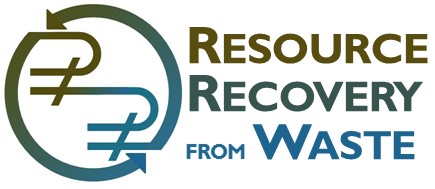Society faces increasing resource scarcity while waste production continues to grow. The waste management sector could play a key role in building a circular economy and solving these problems. However, recovery of physical resources such as minerals and nutrients from wastes is still limited. Waste management is positioned within a dynamic context including environmental, social, political and technological changes which can be difficult to anticipate. Moreover, capacity to consider resource exploitation and waste management holistically from the perspective of interconnected environmental and human health is limited.
RRfW emanates from the belief that a change in the way in which we think about resource and waste management is imperative. We envision a move away from end-of-pipe approaches and one-sided thinking about wastes from an economic and/or technological perspective. Instead, we propose a transition towards whole-system thinking about resources throughout their life-cycles including extraction, cascading of products and resources through our economy and eventually the associated impacts of resource recovery from wastes. In this way supply chains can be redesigned to prevent dissipation of technical, environmental, social, and economic values of materials into wastes at any point in the product life cycle. Such change in thinking supports the transition towards a circular economy.
We envision a circular economy in which waste and resource management contribute to a resilient environment and human well-being.
When developing an ideal vision for the future, it is also important to remain realistic. How can we realise the vision for resource and waste management in the UK? To ensure our research makes a positive difference, we adopted the following values:
- Consider waste as a resource in a circular economy
- Interdisciplinary systems view on resource recovery
- Find sustainable transition pathways with multi-dimensional assessments
- Ecosystem stewardship is integrated with waste and resource management
- Work with the natural environment to recover resources from wastes through biogeochemical processes
- Waste and resource management makes a positive impact on human well-being
- Include societal aspects into scientific analysis enabling uptake of research outcomes
- Co-produce knowledge, tools and technologies with stakeholders
